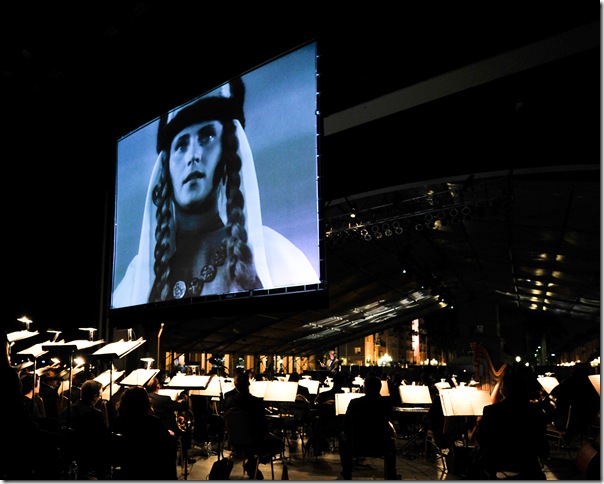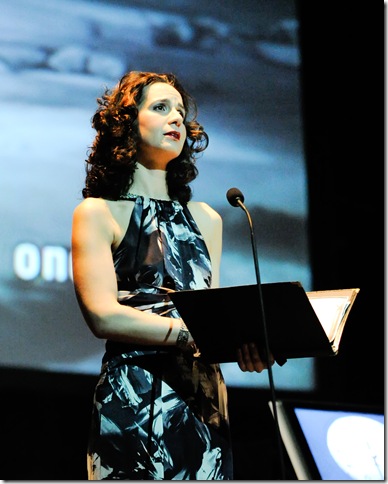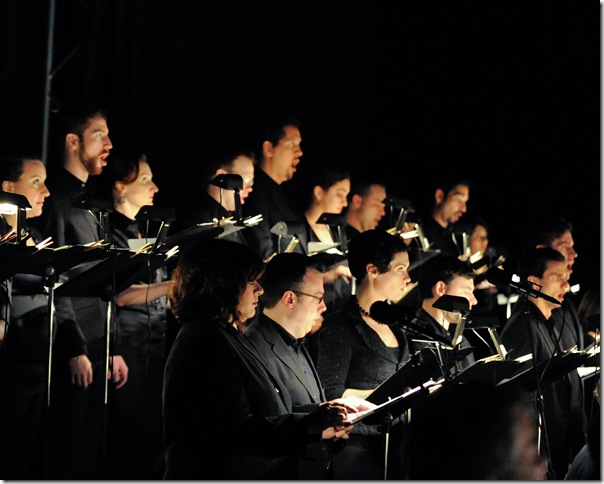In his recent study of Sergei Prokofiev’s Soviet career, the musicologist Simon Morrison reveals that the composer was a huge movie buff, and that for one tantalizing moment, had a chance to do a film score in Hollywood for Paramount.
It didn’t happen, but Prokofiev never stopped trying to write theater and film scores in the Soviet Union, and with Sergei Eisenstein in 1938, he crafted a soundtrack that stands up quite well as absolute music, which is why the cantata he fashioned from it shows up on ambitious symphonic programs.
At the Festival of the Arts Boca on Wednesday night, that Prokofiev-Eisenstein collaboration, Alexander Nevsky, was seen in its entirety while the score was played live by the Russian National Orchestra. The Seraphic Fire concert choir sang the choral parts, and the young mezzo-soprano Kelley O’Connor offered a beautiful reading of the solo aria that appears toward the end of the film.
Presenting the movie as the focus of an orchestral concert was an interesting and largely successful idea, and came a couple months after a similar event this season: a showing of Eisenstein’s Battleship Potemkin, with a live Shostakovich score played by an augmented Palm Beach Symphony. But that film is silent, and while Nevsky doesn’t have an overwhelming amount of dialogue, there are long patches of musical silence while the characters above act out the 13th-century story of how an early defender of the Russian homeland thwarted an invasion by Germanic tribes.
Those pauses made things somewhat awkward at times, also affected some of the playing, with some intonation lapses as instruments were warmed back up. But for the most part, the RNO played well under conductor Constantine Kitsopoulos. Much of the Nevsky score is big and bustling, and the orchestra gave it the appropriate gusto as it accompanied battle scenes, celebrations and religious blessing ceremonies on the screen above.
Seraphic Fire sang its hymns to Mother Russia (Arise, Russian people, for one) with a kind of brute strength that was very appropriate for the music and the drama, and at times it had you wishing for a performance of the cantata to hear this music at a closer remove. Most compelling of all was O’Connor, whose dark, smoky voice added poignancy to the aria Respond, bright falcons, a lovely tune that Prokofiev made sure to repeat in the orchestra afterward.
O’Connor’s appearance was necessarily much too brief, and like Seraphic Fire, her singing increased the appetite for more of them and less of the film.
The audience followed the Nevsky film carefully, it seemed to me, sticking with it despite its stilted, declamatory acting and its nakedly propagandistic purpose. But there doubtless were many in the audience with memories of World War II, and surely it seemed prophetic to them; when the film was made, the Soviets fully expected to have to fight the Third Reich, which was then taking over Czechoslovakia and casting its malevolent eye at Poland.
And indeed it was the difficult weather and the vast, stubbornly defended terrain that ultimately defeated Nazi Germany’s attempt to subjugate the Soviets a few years later, which should have made Nevsky required viewing in the halls of the German high command.
The performance was marred by some sort of structural element for the tent that repeatedly banged against the metal in Wednesday’s high winds, making it that much more difficult to keep your attention during moments of cinematic quiet, and one hopes that’s been fixed for the remaining nights of performances.
The concert opened with a world premiere, a setting for chorus and orchestra by the American philanthropist and composer Gordon Getty of Keats’ La Belle Dame Sans Merci. Getty’s overture Plump Jack was a feature of last year’s Boca festival, and this year’s contribution was, like the overture, mildly interesting.
Getty’s tonal language here was modern but conservative and evoked the gloom of the poem’s famous lines — The sedge has wither’d from the lake/And no birds sing — with slow, stern phrases and the kinds of harmonies that were similar to Prokofiev’s, especially when heard back-to-back. Seraphic Fire conductor Patrick Dupré Quigley led the respectful, well-sung performance.
Tonight’s performance at the Festival of the Arts Boca 2010 features 15-year-old American pianist Conrad Tao in the Rachmaninov Third Concerto (in D minor, Op. 30), and the Kyrgyz-born jazz phenomenon Eldar Djangirov in his own Iris and music by Duke Ellington. Constantine Kitsopoulos conducts the Russian National Orchestra in the concert, which also includes music by Shostakovich (Festive Overture, Tahiti Trot), Rimsky-Korsakov (the overture to May Night) and Bernstein (Slava!) 7 p.m., Count de Hoernle Amphitheater, Mizner Park. Tickets: $25-$150. Call 866-571-2787 or visit www.festivaloftheartsboca.org.


